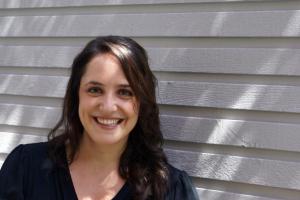
Assistant Professor Efrat Arbel is a highly-accomplished alumna and one of the newer members of the Allard School of Law faculty. She earned her doctorate from Harvard Law School in 2012, where she worked under the supervision of Dean Martha Minow. She holds a BA from McGill University, a JD from UBC, and completed her LLM studies at Harvard Law School before proceeding with her doctorate. Dr. Arbel was selected for numerous fellowships and awards throughout her graduate studies, and held a Canada Research Fellowship with Harvard’s Weatherhead Center for International Affairs from 2008-2011. She has also held positions as a teaching and research fellow at Harvard Law School; as a research fellow at the Kennedy School of Government; and as a researcher with the Harvard Immigration and Refugee Law Clinic. Before pursuing graduate studies, Dr. Arbel clerked at the British Columbia Supreme Court and worked in the Vancouver office of a national firm.
What are you currently working on?
My current research is focused on Canadian constitutional law. At the moment, I am working on a book manuscript that analyzes constitutional approaches to rights protection within and across three fields of law: refugee law, Aboriginal law, and prison law. In this book, I strive to develop an understanding of Canadian constitutional law that emerges from examining these fields together, rather than analyzing them as distinct.
What made you turn to these fields?
The constitution itself – section 91 of the Constitution Act, 1867 to be specific. In delineating the balance of powers between the provinces and the feds, section 91 identifies three “classes of subjects” that fall within the exclusive authority of the federal government: “Aliens”, “Indians”, and “Criminals”. This piqued my interest. And it ultimately led me to study the Canadian constitution through these three fields of study – refugee law, Aboriginal law, and prison law.
What interests you about these fields?
I find it interesting that despite clear constitutional commitments to rights protection in each of these fields of law, we see serious gaps between the promise of rights protection as it is articulated by the courts, and the actual record of their enforcement. My work focuses on these gaps – on these shortfalls – and analyzes what they reveal about the limits and possibilities of Canadian constitutional protection.
This is a very interesting time to be working in these fields of law. In the last few years we’ve seen big changes in each area, and significant legal challenges in each field, whether in relation to Aboriginal title, mandatory minimum sentences, parole eligibility, refugee rights, or human smuggling. These challenges have invited the courts to confront the limits and possibilities of constitutional rights protection in each field, with some fascinating results.
You are actively involved in advocacy and litigation. Why did you decide to become a scholar?
For me, it’s not a matter of choosing between scholarship and advocacy. I see the two as interconnected – my scholarship bleeds into my advocacy work and my advocacy works bleeds into my scholarship. One of the great privileges of being a legal academic is having the opportunity to combine the two – to think critically and conceptually about questions of law through academic research, and also bring that research to bear on advocacy and litigation.
I was also fortunate, after graduating with my JD from UBC Law, to complete both my masters and doctoral degrees at Harvard Law School. I had the privilege of working with, and learning from, some extraordinary people during my time there – particularly my doctoral supervisor Dean Martha Minow, whose work continues to be a tremendous source of inspiration for me. Working in the United States also afforded me a great opportunity to research Canadian law in comparison with U.S. law. Canadian and U.S. courts are grappling with many similar issues in my fields of study, and we have much to learn from one another.
You’ve since returned to join the faculty at UBC. What does UBC Law mean to you?
UBC Law is where I started my legal career, and where I first developed an interest in constitutional law and justice issues. I am thrilled to come back to join the faculty. UBC Law has such strengths in constitutional law and social justice, and it is also located in Vancouver, which is home to a vibrant and engaged social justice community. This community is doing great work to bring about legal change in this city, this province, and across the country, and has been at the forefront of some of the most meaningful constitutional challenges that have come before the courts in recent years. I am very fortunate to be part of this community, and very excited to call UBC Law home.
What advocacy projects are you involved in at the moment?
I serve on the executive of the Canadian Association of Refugee Lawyers, an organization that promotes just and consistent practices in the treatment of refugees in Canada. At the moment, I am working on a constitutional challenge before the Federal Court of Appeal – concerning government cuts to refugee health care – with a team of lawyers and academics across the country. I also get to work with a stellar group of law students, including three students here at UBC Law – Jeffrey Bradshaw, Naomi Moses, and Eileen Myrdahl. The students have contributed great research to the case, and have come up with such interesting and creative arguments. Working with students, be it through projects like these or through teaching generally, is one of the things I love most about my job.